Panda Go Panda
Introduction
It turns out that genius doesn't just burst into existence; it has to be nurtured, coddled, developed. Perfection takes time, although we rarely get to see the process, often only getting to experience a creator's finest and most lauded works. Two of Studio Ghibli's most feted creators are Isao Takahata, and Hayao Miyazaki. Takahata's output as director is usually quirky, imaginative and engrossing, with films like Pom Poko, Only Yesterday, My Neighbours the Yamadas, and Grave of the Fireflies to his name. Hayao Miyazaki on the other hand is regarded in the West as the Japanese Disney, with magical, family entertainment and heart warming stories like Kiki's Delivery Service, Spirited Away, Howl's Moving Castle, Porco Rosso, and My Neighbour Totoro made under his directorial control. But the fact is that the two more often than not have always collaborated on their films, and Studio Ghibli has been built around their collective genius. But their output together predates Studio Ghibli by some 20 years, indeed Little Norse Prince came out in 1968. Panda! Go Panda! is more of a prototype for the general audience, family friendly affairs, sort of their Steamboat Willie, and elements of Panda! Go Panda! are familiar if you've seen My Neighbour Totoro.
I remember Panda-mania sweeping the world. When I was a child, there was always news of the latest cultural export from China, pandas being sent to zoos all over the world, and there was always a fascination with the shy, sedentary animals. That was no less true in Japan, and Panda Kopanda (literally Panda and Little Panda) capitalised on that in 1972. The following year a second animation featuring the characters was released, and this disc from Manga Entertainment collects the two and loosely edits them into a feature length animation titled Panda! Go Panda!, directed by Isao Takahata, and with storyboards and layout by Hayao Miyazaki.
Panda Family
A little girl named Mimiko puts her grandmother on a train, assuring her that she will be fine looking after herself. She comes home to find paw-prints leading around the back, chewed bamboo, and a little baby panda asleep on the back porch. They quickly become friends, but when the panda's father shows up, he takes pity on Mimiko after learning that she is an orphan, and promises to be a father to her. She in turn promises to be a mother to little Panny, and so their adventures begin. First Panny follows Mimiko to school, and then a zookeeper shows up, looking for his lost exhibits.
The Circus In The Rain
Mimiko and the pandas have a new guest, a little baby tiger called Tiny. After a goldilocks introduction, they're happy to have a new member of the family, but Tiny's actually run away from the circus, and his existing family are looking for him. One reintroduction later, and the pandas have a trip to the circus to look forward to. But then the rain starts falling, and it keeps on falling. It may be fun for Mimiko and the pandas to be suddenly living in the middle of a lake, but the circus needs help.
Picture
Panda! Go Panda! gets a 4:3 transfer, which is clear, bright and colourful, certainly not showing any particular signs of aging over the last thirty-odd years. It's an NTSC-PAL conversion of course, with the usual degree of softness, but it certainly isn't a major issue. The age tells in the style of the animation, and the character designs. It's very simplistic, full of primary colours, and very much of its time.
Sound
You have a choice between DD 2.0 English and Japanese with an optional translated subtitles track. The dialogue is clear with naturalistic performances, and the music is very gentle and pleasant, and again, of its time. The dub is surprisingly good, with an effort to find English voices that match the original Japanese actors in tone.
Extras
All you get here is the original Japanese opening, and a couple of pages of text biographies for Miyazaki and Takahata.
Conclusion
It's not often that I feel my age creeping up on me; in fact I've been clinging to my childhood with a tenacity that most sensible people would consider past unseemly. But Panda! Go Panda! is one of those shows that painfully reminds me that the clock does tick for us would be Peter Pans, just as it does for lesser mortals. This is a show that is definitely aimed for a much younger demographic than mine, and I found little here that appealed to me. That's despite its obvious similarities to My Neighbour Totoro, a film that I love. It just doesn't have the same broad audience appeal, instead truly targeted at young children alone.
The characters and the stories are appealing enough, inoffensive and pleasant. Mimiko is a happy go lucky child, finding wonder in all she sees, and she forms a sweet relationship with the playful baby panda. Daddy panda is an odd fellow, much like Totoro in stature and outlook, happily adopting Mimiko as a daughter, and becoming quite domesticated around the house, putting his feet up and sucking thoughtfully on a pipe, although he doesn't quite get the whole 'job' aspect of fatherhood. Later on, Tiny the tiger turns out to be just as playful as Panny, while the circus folk are just the slightest bit mean in the way they treat their animal friends.
It's all perfect viewing if you're just a few years old, but anyone getting close to their first double-digit may find it a little tiresome. Of course it's not at all OFCOM friendly, with Mimiko apt to show her pleasure by doing a pants-revealing handstand, happy to live alone without adult supervision, with a baby panda and tiger playing on a railway line without fear or consequence, with the aforementioned pipe smoking panda, and an eagerness to meet and play with burglars. The seventies were such an innocent time…
The circus story is a little more entertaining the first story, but I wonder how much play this show will get with its target audience now more used to flashy CG animations and fast paced gag-fests. It would be a disappointment if the only audience Panda! Go Panda! could garner today would be thirty-something Ghibli completists. Panda! Go Panda! is for children of child age only.
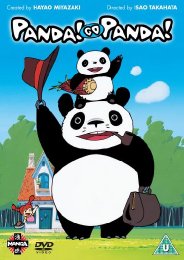
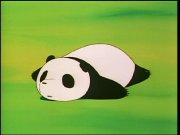
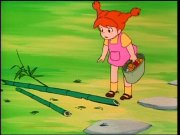
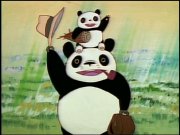
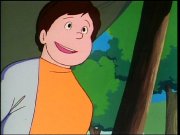
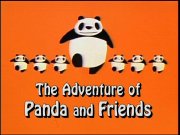
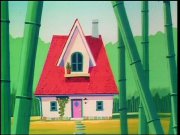
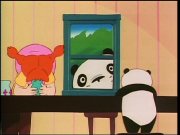
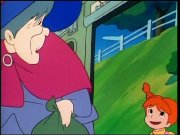
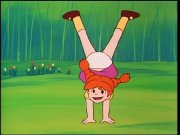
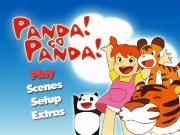
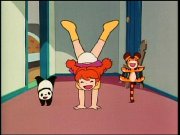
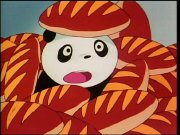
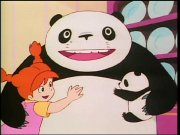
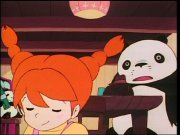
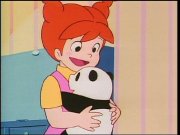
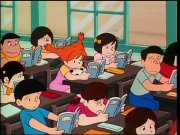
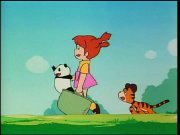
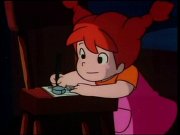
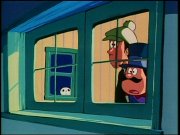
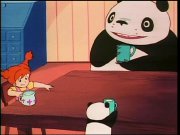
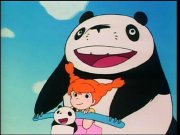
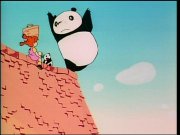
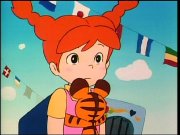
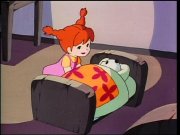
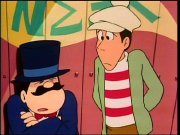








































Your Opinions and Comments
Be the first to post a comment!